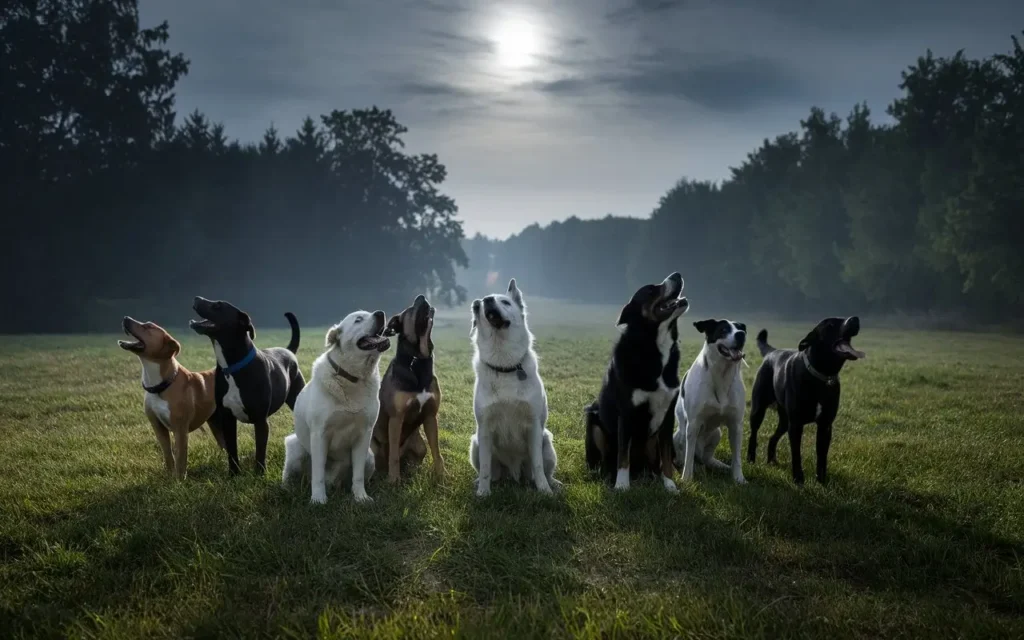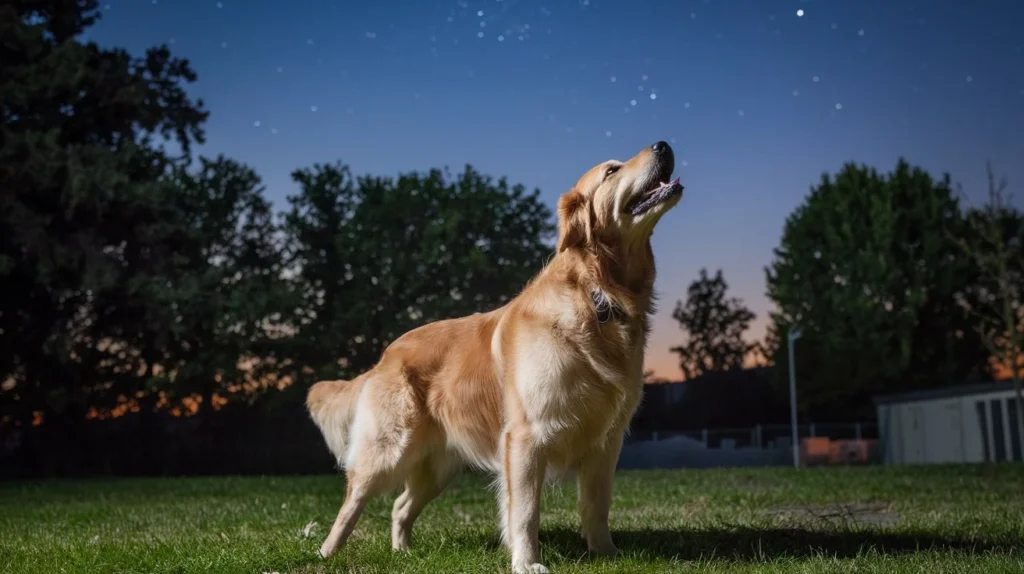Have you ever been startled awake by the haunting sound of a dog howling in the distance? As a result, you may have found yourself wondering: why do dogs howl at night? Indeed, this age-old question has puzzled humans for centuries, consequently leading to various theories and superstitions. In this comprehensive guide, we’ll therefore explore the science, instincts, and cultural beliefs surrounding this intriguing canine behavior.
The Primal Instinct: Unraveling Why Dogs Howl at Night
To begin with, understanding why dogs howl at night requires us to look back at their wild ancestors. In fact, wolves, the closest living relatives of our domesticated dogs, use howling as a primary form of long-distance communication. As a result, this behavior has been deeply ingrained in canine DNA, thus persisting even in our beloved pets.
Evolutionary Reasons for Nocturnal Howling
Moreover, howling serves several crucial functions in wolf packs:
- Territory marking: First and foremost, wolves howl to announce their presence and warn other packs to stay away.
- Pack assembly: Additionally, it’s a way to call pack members together, especially after a hunt or when separated.
- Social bonding: Furthermore, group howling strengthens pack ties and unity.
Consequently, our domesticated dogs have inherited these instincts, which may explain why they sometimes howl at night for seemingly no reason.

Modern Triggers: Why Dogs Bark and Howl at Night in Urban Settings
While the ancestral instinct plays a significant role, several modern factors can also trigger nocturnal howling in dogs:
1. High-Pitched Sounds Causing Dogs to Howl at Night
To begin with, dogs have incredibly sensitive hearing, capable of detecting frequencies far beyond human range. As a result, common nighttime sounds that might provoke howling include:
- Sirens from emergency vehicles
- Music with high notes
- Whistles or alarms
Consequently, when dogs hear these sounds, they may interpret them as howls from other dogs and respond in kind.
2. Separation Anxiety Leading to Nighttime Howling
Furthermore, for many dogs, nighttime means being separated from their human family. This separation can therefore cause anxiety, leading to howling as a way to:
- Call for attention
- Express distress
- Attempt to locate their pack (i.e., their human family)
3. Medical Issues Triggering Dogs to Howl at Night
In addition, dogs sometimes howl at night due to physical discomfort or health problems. For instance, potential medical reasons include:
- Chronic pain
- Cognitive dysfunction in older dogs
- Hormonal imbalances
Hence, if your dog suddenly starts howling at night, it’s essential to consult with a veterinarian to rule out any underlying health issues.
Superstitious Beliefs: Why Dogs Howl at Night and Associated Myths
Throughout history, the eerie sound of dogs howling at night has sparked numerous superstitions and folklore beliefs. Let’s explore some of these intriguing cultural interpretations:
Ancient Superstitions About Dogs Howling at Night
- Harbingers of death: Firstly, in many cultures, a dog’s nighttime howl was believed to predict an imminent death in the community.
- Supernatural connections: Secondly, some believed that howling dogs could see spirits or sense supernatural presences invisible to humans.
- Omens of misfortune: Thirdly, in certain traditions, a dog’s howl was interpreted as a warning of impending disaster or bad luck.
Modern Myths About Nocturnal Dog Howling
While many of these beliefs have faded in modern times, some superstitions nevertheless persist:
- Full moon effect: On one hand, some people believe dogs howl more during a full moon, though scientific evidence for this is lacking.
- Psychic abilities: On the other hand, there are those who claim that dogs can sense future events or disasters, expressing this knowledge through howling.
It’s important to note, however, that these superstitions lack scientific basis. In reality, the reasons why dogs howl at night are rooted in biology, instinct, and environmental factors rather than supernatural causes.
Behavioral Insights: Understanding Why Dogs Bark and Howl at Night
However, whereas howling and barking are two distinct vocalizations, they often serve very similar purposes in the communicating behavioral repertoire of dogs. Thus, any investigation into the relationship between the two may provide further insight into nighttime canine vocalizations.
Differences Between Nighttime Barking and Howling
- Sound characteristics:
- Barking: First, we have short, sharp sounds
- Howling: In contrast, we observe long, drawn-out vocalizations
- Communication range:
- Barking: On one hand, it’s typically for short-distance communication
- Howling: On the other hand, it’s designed to carry over long distances
- Primary functions:
- Barking: Primarily, it’s used to alert, warn, or express excitement
- Howling: In comparison, it’s used for long-distance communication, territorial marking, and social bonding
Reasons for Dogs Barking and Howling at Night
Dogs may alternate between barking and howling at night for various reasons:
- Territorial defense: Initially, they may bark to alert owners of potential intruders, followed by howling to mark territory.
- Attention-seeking: Subsequently, they might start with barks to get attention, escalating to howls if ignored.
- Response to stimuli: Finally, they could bark at immediate triggers (e.g., a passing car) and howl in response to distant sounds.
Understanding these behaviors can therefore help pet owners address the root causes of nighttime vocalizations more effectively.
Debunking Myths: Why Do Dogs Howl at Night for No Apparent Reason?
Often, pet owners claim their dogs howl at night for no apparent reason. However, there’s usually an underlying cause, even if it’s not immediately obvious to us. Let’s explore some potential explanations:
1. Undetected Stimuli Causing Nighttime Howling
To begin with, dogs can perceive sounds and smells that are imperceptible to humans. As a result, what seems like random howling might be a response to:
- Ultrasonic sounds from electronic devices
- Distant animal noises
- Unfamiliar scents carried by the wind
2. Learned Behavior Leading to Nocturnal Howling
Furthermore, if howling has previously resulted in attention or rewards, dogs may repeat the behavior, even when the original stimulus is absent. This can therefore create the illusion of howling for no reason.
3. Circadian Rhythm Disruptions and Their Impact on Dog Howling
Moreover, changes in a dog’s sleep-wake cycle can lead to increased nighttime activity, including howling. For instance, factors that might disrupt circadian rhythms include:
- Changes in household routines
- Jet lag after travel
- Seasonal changes affecting daylight hours
4. Cognitive Changes Resulting in Nighttime Dog Howling
Additionally, in older dogs, cognitive dysfunction syndrome (similar to dementia in humans) can cause confusion and increased vocalization at night.
By understanding these potential triggers, pet owners can consequently better address what might seem like random howling and provide appropriate solutions or interventions.
The Paranormal Connection: Exploring Why Dogs Howl at Night and Ghost Legends
The howling of dogs at night was associated with ghostly presences and became a trope in horror stories and urban legends for generations. As much as there is no scientific evidence supporting such a belief that dogs can detect ghosts, this belief somehow holds a spot in popular culture.
Origins of the Ghost-Howling Connection in Folklore
Several factors contribute to this enduring belief:
- Heightened senses: First and foremost, dogs’ superior hearing and smell abilities lead some to believe they can detect supernatural entities.
- Nocturnal timing: Secondly, the eerie atmosphere of night amplifies the spooky connotations of a dog’s howl.
- Cultural folklore: Lastly, many cultures have traditional stories linking dogs to the spirit world.
Scientific Explanations for “Ghost-Sensing” Behaviors in Dogs
When dogs appear to react to unseen presences, there are usually rational explanations:
- Infrasound detection: To begin with, dogs can hear very low-frequency sounds that humans can’t, which might be mistaken for ghostly activity.
- Electromagnetic sensitivity: Additionally, some theorize that dogs may react to changes in electromagnetic fields, which are sometimes associated with alleged paranormal activity.
- Human cues: Furthermore, dogs are highly attuned to human body language and may react to subtle, unconscious cues from their owners.
While the idea of dogs howling at ghosts is intriguing, it’s important to approach such claims with skepticism and instead look for more plausible explanations rooted in canine biology and behavior.

Managing Nighttime Howling: Tips for Addressing Why Dogs Howl at Night
If your dog’s nocturnal howling is becoming a problem, there are several strategies you can employ to manage this behavior:
1. Identify and Address the Cause of Nighttime Dog Howling
- First, keep a log of when and where the howling occurs to identify patterns.
- Then, check for potential triggers like outdoor noises or changes in routine.
- Finally, consult with a veterinarian to rule out medical issues.
2. Provide Mental and Physical Stimulation to Reduce Nocturnal Howling
- To start, ensure your dog gets plenty of exercise during the day.
- Next, use puzzle toys and interactive games to keep your dog mentally engaged.
- Lastly, consider increasing playtime or walks in the evening to tire your dog out before bedtime.
3. Create a Comfortable Sleep Environment to Prevent Dogs Howling at Night
- First and foremost, provide a quiet, dark space for your dog to sleep.
- Additionally, use white noise machines or soft music to mask external sounds.
- Moreover, consider crate training if it helps your dog feel more secure.
4. Behavioral Training Techniques to Address Why Dogs Howl at Night
- To begin with, teach the “quiet” command using positive reinforcement.
- Next, ignore howling that’s attention-seeking, and reward quiet behavior.
- Finally, consult a professional dog trainer for persistent issues.
5. Address Separation Anxiety to Reduce Nighttime Howling
- First, gradually accustom your dog to being alone for increasing periods.
- Then, leave comforting items with your scent when you’re away.
- Lastly, consider anti-anxiety products like pheromone diffusers or calming supplements (under veterinary guidance).
By implementing these strategies, most pet owners can significantly reduce or eliminate problematic nighttime howling, thus ensuring peaceful nights for both dogs and their human companions.
Conclusion: Embracing the Nighttime Howl of Dogs
As we’ve explored the multifaceted reasons why dogs howl at night, it’s clear that this behavior is a complex interplay of instinct, environment, and individual personality. From ancient wolf-like communication to responses to modern urban stimuli, howling remains an integral part of canine expression.
Notably annoying as it may be, nighttime howling is best viewed with understanding and patience. We can thus address problem howling-recognizing its underlying causes and applying appropriate management strategies-while continuing to appreciate this fascinating aspect of dog behavior.
It is important to remember that howling is a testimony to your dog’s wild heritage and unique method of communication. Each howl has a story, whether it be in response to the sirens, anxiety, or connection with the environment. That makes us, as pet owners, listen and understand our canine companions and guide them toward behaviors working harmoniously in our lives together.
So the next time you hear a dog’s haunting howl pierce the night, take a moment to appreciate the ancient instincts at play. It’s not just noise; it’s an echo of the wild, a call to unseen pack members, and a reminder of the deep bond between humans and their four-legged friends that has spanned millennia. By understanding why dogs howl at night, we can consequently foster a deeper connection with our canine companions and create a more harmonious living environment for all.








